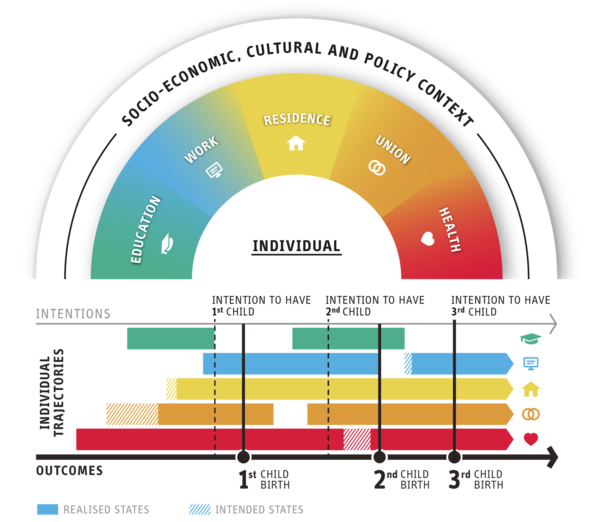Birthlife
Births and other life goals: complementarity or competition?
In Europe and other affluent countries people tend to have fewer children than those they would like to have by the end of the reproductive period. In previous research on this topic the correspondence between childbearing plans and outcomes had generally been investigated in isolation from choices and events in other life course domains. This project tackles this central issue in an innovative way and acknowledges the gap between intended and realised fertility in the unified framework of a cross-domain life course approach. Using cross-country comparative and longitudinal data, the project investigates the transition path from birth intention to birth outcome at the intersection of life course domains intimately related to the family formation process, such as education, partnership, work, and residence. Life courses are considered in their structural and institutional context. The project aims to disentangle the correlation structure across individuals’ simultaneous life goals (or intentions) and individuals’ subsequent behaviours (or outcomes). Methodologically, the novelty of the project lies in its use of recent cross-country comparative and longitudinal data; and, theoretically, in its specification of competing goals and the opportunities for goal achievement in different social contexts. The project will address the following research questions:
- Are there interdependencies in the ways adult individuals make their decisions in different life domains, including education, partnership, childbearing, work, and residence?
- Are life course circumstances responsible for matches and mismatches between intended and realised births and intended and realised events pertaining to other spheres of adult life? How do life intentions/goals other than childbearing influence the match between birth intention and birth outcome?
- How are the different intention-behaviour matches and mismatches in childbearing and parallel fields of life influenced by the context in which adult individuals operate?
The project will use latent class analysis and simultaneous hazard modelling of the various life course intentions and behavioural outcomes to see whether parallel life domains are independent or how they hang together. BIRTHLIFE project will offer new perspectives for understanding reproductive decision-making, actual fertility and goal achievement in other life course domains. This knowledge will help policy-makers design measures aimed at facilitating work-family reconciliation and the achievement of other goals in life that will help generate and maintain individuals’ well-being.
Publications:
Barker, R., & Buber-Ennser, I. (2024, 2024/09/01/). Uncertainty and flexibility of fertility intentions. Advances in Life Course Research, 61, 100618. https://doi.org/10.1016/j.alcr.2024.100618
Buh, B. (work in progress). Couples’ Employment, Education, and the Transition to Parenthood in the United Kingdom.
Buh, B. (work in progress). Housing expenditure and childbirth in the United Kingdom.
Buh, B., Beaujouan, É., & Berrington, A. (work in progress). Residential mobility, belonging to the neighbourhood, and the transition to parenthood.
Barker, R., Buber-Ennser, I., Nguyen, Y. T. H., & Testa, M. R. (2023). The importance of family, leisure, work, and friends. VID Working Paper 04/2023. https://doi:10.1553/0x003e87d9
Nguyen, Y. T. H., Dang, T. N. H., Buh, B., & Buber-Ennser, I. (2023). Co-residence with parents, son preference, and women’s desire for additional children in Vietnam. VID Working Paper 03/2023. https://doi.org/10.1553/0x003e7385
Buh, B. (2023). Measuring the effect of employment uncertainty on fertility in low-fertility contexts: An overview of existing measures. Genus, 79(1), 1-23. https://doi.org/10.1186/s41118-023-00185-x
Barker, R., & Buber-Ennser, I. (2022). Uncertainty and flexibility of fertility intentions. VID Working Paper 03/2022. https://doi.org/10.1553/0x003e60ec
Buh, B. (2022). Which type of employment uncertainty matters when becoming a parent? An analysis by educational attainment in the United Kingdom. VID Working Paper 01/2022. https://doi.org/10.1553/0x003d6deb
Testa, Maria Rita., & Bolano, Danilo. (2021). When partners’ disagreement prevents childbearing: A couple-level analysis in Australia. Demographic Research, 44(33), 811–838.
https://doi.org/10.4054/DemRes.2021.44.33
Buh, B. (2021). Measuring the effect of employment uncertainty on fertility in Europe (A literature review). VID Working Paper 03/2021. https://doi.org/10.1553/0x003cfe1f
Presentations:
Buh, Brian. (2023). Housing Expenditures and Fertility in the United Kingdom. WIC- Colloquium.
Buh, Brian. (2022). Housing Costs and Fertility in the United Kingdom. PopFest 2022
Buh, Brian. (2022). Employment status, subjective perception of financial security, and first birth timing. Family Life and the Changing World of Work Conference 2022
Buh, Brian. (2022). Employment status, subjective perception of financial security, and first birth timing. British Society for Population Studies 2022
Buh, Brian. (2022). Housing Costs and Fertility in the United Kingdom. Paper presented as poster at the British Society for Population Studies 2022
Buh, Brian. (2022). Housing Costs and Fertility in the United Kingdom. Paper presented as poster at the European Population Conference 2022
Buh, Brian. (2022). Employment Uncertainty and the Perception of Financial Security when Transitioning to Parenthood. Population Association of America 2022
Barker, Ross. (2022). Mum’s the word… using web scraping and text analysis to better understand women’s expressions and experiences of motherhood. Paper presented as poster at the 13th Conference of Young Demographers.
Buh, Brian. (2022). The Cost of Childcare and Housing on Completed Fertility in the United Kingdom. Paper presented as poster at the 13th Conference of Young Demographers.
Barker, Ross., & Buber-Ennser, Isabella (2021). An exploration of uncertainty and flexibility in fertility intentions. Paper presented at the 6th GGP User Conference, online.
Buh, Brian (2021) Job instability and perceptions of employment uncertainty’s effect on fertility outcomes. Paper presented at the Understanding Society Scientific Conference 2021, online.

